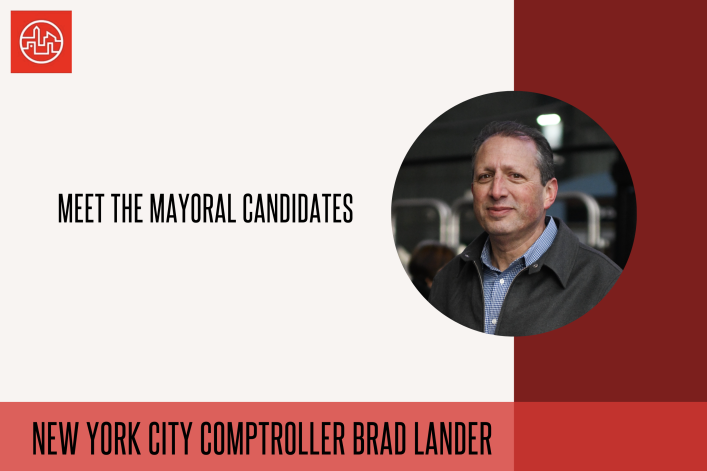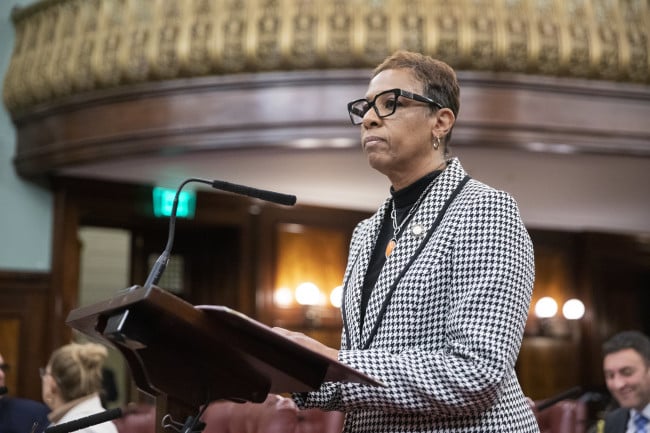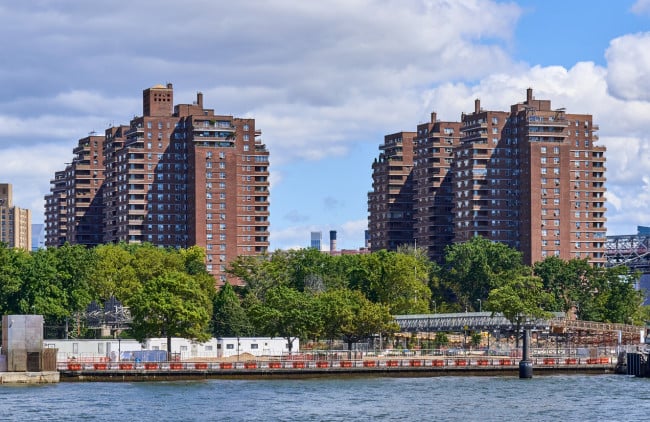Brad Lander pitches homesharing and co-ownership for city workers to ease the housing crisis
- Brick spoke with Lander in the first of a series of interviews with candidates on their housing priorities
- The NYC comptroller is open to changing housing law to make co-living legal
- He also pitched a plan to have the city pension fund help city workers buy apartments

Lander also proposed ramping up code enforcement at NYC buildings where residents regularly complain of a lack of heat.
Brick Underground/Celia Young
New York City Comptroller Brad Lander bought an apartment with his wife in the 1990s for $125,000. That move gave him the ability to build a life in NYC, and inspires one of his housing priorities: He wants to make affordable homeownership possible for all New Yorkers.
Lander is one of the many candidates running for NYC mayor. As the race heats up, Brick Underground is interviewing the candidates who—if victorious—will go on to shape housing development and regulation in New York City.
The mayor will oversee city agencies that regulate landlords, the implementation of NYC’s landmark climate law, Local Law 97, and new construction enabled by the City of Yes for Housing Opportunity plan.
In short, it’s a big job, and there’s a lot of candidates who want to do it. Brick Underground caught up with Comptroller Brad Lander last week to talk about how he’d tackle housing if he were to become NYC’s next mayor.
Lander hopes to use the city’s pension fund to help city workers become homeowners, build more housing through rezoning part of the city, and to connect small property owners with renters through an Airbnb-style platform. Read on to learn more about Lander’s housing plan.
All candidates answered a quick series of questions about major NYC housing issues before going into detail about their own proposals. This interview has been edited for length and clarity.
| Lightning round questions | Brad Lander’s answers |
|---|---|
Local law 97: Do you think fines should be delayed or enforced for buildings not in compliance with Local Law 97? | I think fines should be enforced, but a better system is needed to help especially co-ops and affordable housing be able to comply. |
Short-term rentals: Would you support rolling back NYC’s short-term rental restrictions and allowing small homeowners to rent out their properties for fewer than 30 days without the owner on the premises? | No. I don't support [the City Council bill] Intro. 1107, which would allow more housing to be converted to short-term rentals or hotel-like units, but I did put out this program called HomeShare NYC, which would facilitate—via a platform like Airbnb—stays of longer than a month. |
Rent freeze: Would you support a rent freeze for the city’s rent-stabilized apartments? | I would support a rent freeze if the data that’s reported to the Rent Guidelines Board, in any particular year, shows that we can do it. I want to keep rents as low as possible, but it’s got to be consistent with delivering on the warranty of habitability and good conditions and repairs….I would appoint people who want to keep rents as low as possible, and then look at the data every year as the law requires. |
Housing vouchers: Would you support expanding eligibility for the CityFHEPS housing voucher program, as was passed by the Council in 2023? | There were four laws passed that all expanded eligibility in some ways. The first three of them I support in full and would implement. For the fourth [Intro. 893-a], the key is to get the state on the field here. The state has failed consistently to pass the Housing Access Voucher program, and for that fourth category, state funding and HAVP are needed to make it work. |
Affordable apartments: What could you do to incentivize the construction of affordable, family-sized apartments? | At the center of my housing plan will be a renewed focus on affordable homeownership and co-ops for families, like we used to build in Co-op City, Penn South, or Amalgamated Hous[ing Cooperative]. …The city really needs to produce the kind of housing that families need and that enables them to stay and build a life here. |
You proposed the HomeShare NYC program, which would create a program to match renters with owners looking to rent out their extra rooms. But it’s illegal in NYC to rent out an individual room in an apartment unless a building is zoned for single-room occupancy. And roommates have to be given access to the entire apartment. How would HomeShare differ from an owner taking on a roommate in NYC?
I’m open to some tweaks to the law to make it more possible. The fact that you can’t have more than three unrelated people sharing an apartment is antiquated and must be eliminated. I’m in favor of changing the laws to allow more roommates. Developers like Common—who build housing for someone in college or just out of college and interested in living in a place with four or five people who share a kitchen and two bathrooms—that’s product that should be legal and is not legal today.
In some cases, what I’m proposing is already legal, and in some cases, there will need to be tweaks [to the law] and it will need to be facilitated by a better online matching system with some support. I would like a piece of the program to be specifically for CUNY students.
We estimate there are about 10,000 rooms that could be rented like this, and it would be so much better to have them be for medium- to long-term tenants, rather than for short-term rentals.
Would you be open to changing the law to make co-living legal?
Yes.
Some property owners might fear a home sharer overstaying their welcome and being forced to go through the eviction process to remove them. How would you address that?
In some ways the CUNY partnership is a model of what I’m looking to have here. Of course it’s up to [the owner.] This isn’t a lottery system where you would have to take anyone whoever applies. There will be a system of vetting, and one element of it would be a partnership with CUNY. In that case, you would know where that young person goes to school and that they’ve got ties here.
It would include legal insurance, so that if something did happen where a landlord in the program needed a lawyer they wouldn’t have to pay for it out of pocket. There would be lots of vetting up front. Some people might want someone who can do some share of cleaning or cooking or childcare tasks, and sometimes it might just really be a rental and you want to make sure the person has ability to pay.
There’s a risk with short-term rentals that the person will trash your place because they have no accountability to you over time. With someone [staying] longer term, there are a different set of responsibilities and obligations and risks and a lot of those can actually blossom into really great relationships. In a small number of cases where there are problems, this system will have legal insurance and enforcement built in.
You’ve also proposed a co-ownership plan to help city workers buy property. The plan involves the city pension fund putting up the funds to pay for half the sales price of a property and the worker paying the other half. How would this work if these owners want to sell or refinance later?
We would start with a pilot round of 1,000. Some of those people might look to sell in a couple years and some might look to sell in a couple of decades. That can be balanced out over the city’s pension portfolio.
The [median] price for a home in NYC is around $800,000. So let’s say a teacher can afford a mortgage for $400,000 but the home is $800,000, so the pension fund puts up the other $400,000 and now that teacher and her family can buy that $800,000 home.
Let’s say they own it for a few years, and now when they go to sell it's worth a million. In that case they would split the proceeds. If you were able to buy the city’s share down you could do that, or buy out the city’s half or a piece of it.
You have a plan to build 582,000 units of housing by 2035. Part of that plan is by seizing distressed properties and using city properties to create a land bank to build housing. Who would be served by these developments?
We need half a million new units over the coming decade to address the lack of supply in New York City. That’s going to be part of a broad set of strategies like: City of Yes allowing a little more housing in every neighborhood, rezonings like the one I was proud to lead in Gowanus, and investment in places where new infrastructure is being invested by the city. We’ll have some more details about that soon.
Private developers, who own most of the land in New York City, will build most of those units. And we also want it to be possible for public and nonprofit developers to build more as well.
One of the tools I’m excited about is the public housing preservation trust to help support NYCHA units that don’t want to stay as traditional public housing or go through the PACT program with a private manager. That entity was created in a way where it could act as a public developer...It can function as a land bank for distressed housing, and then you can make the housing permanently affordable and more deeply income targeted, or you can do the affordable homeownership option.
We need more market-rate units, we need more affordable units, we need more rental units, we need more affordable co-op and homeownership units. We’ve got to preserve existing stock and we’ll have more details on how to actually do that: what the housing department needs to be and look like, how NYCHA needs to work, how the preservation trust needs to work, how to align city infrastructure investments and how to support more market development as well.
NYC may face a federal funding shortfall. What are your plans to address how this would impact NYC housing?
Last week I spent my time battling Elon Musk for the $80 million he stole from us, and I’m not letting go of that. (And I did get the overdraft fee back.)
The city’s going to have to increase its general reserves to prepare for the federal risks that are coming. For NYCHA, Trump proposed (when Ben Carson was HUD Secretary) to eliminate the public housing capital reserve entirely and cut the public housing operator reserve by a third. That did not get through Congress, but it would have been devastating. Now, there's every reason to fear—whether or not they can get Congress to vote for it—that they will decimate the public housing budget.
This is why we need to be able to use all the tools in the toolkit for public housing. What I support is for residents to have a vote in each and every case. Right now, they have to vote to go into the preservation trust, but they don’t have a vote on whether to go into the PACT program. They should have a vote whether they want to stay as traditional Section 9 [public housing], understanding the risks that are presented by the horrors of the Trump administration: that there will be no money for comprehensive modernization, and even that money could be cut for maintenance and repairs.
The NYCHA preservation trust, which is just getting started, is an option, and the PACT program with a private manager is an option. There’s $80 billion of capital repair needs across NYCHA and we need all of those options on the table. Residents deserve to have a voice about which option they collectively choose, given the needs of their building and the risks they will face.
Is there anything else you’d like to add about your housing policy positions?
I’ll tease a couple other fun things we’ll have in the housing plan. We’ve found that there’s 1,000 multifamily buildings in New York City that have had persistent heat complaints over the last five years. The city has failed to deliver for them.
We’ve laid out a plan for more strategic and targeted code enforcement so tenants—mostly in the Bronx, largely people of color, and largely low-income tenants—aren’t freezing, and [aren’t] using space heaters that can cause fires.
Both NYCHA and HPD are in very serious need of a management overhaul. We’ve put out a very detailed plan called Building Blocks of Change that really spells out what’s needed to fix HPD and some creative programs at NYCHA like a Yelp for NYCHA repairs app, which came out of a tenant-directed audit.
We looked at repairs in tenants’ units of up to $15,000 and found no oversight of the vendors—and half the time, the work hadn’t been done or there was no evidence that it had been done. We came up with this idea for a Yelp-like app where, before a vendor would get paid for repairs that were done in a tenant’s unit, the tenant would get an opportunity via a simple app to say, “yes, the work got done,” or “no, it didn’t.” Very quickly you’ll have real vendor scorecards with no new bureaucracy.
People need real plans for how our housing agencies are going to actually work to deliver and we’ve put out the most detailed plan for how to do that.
Editor’s note: Brick Underground is interviewing candidates for the 2025 New York City mayoral election. If you’re a candidate and you’d like to talk to us, please get in touch by March 15.
You Might Also Like



























